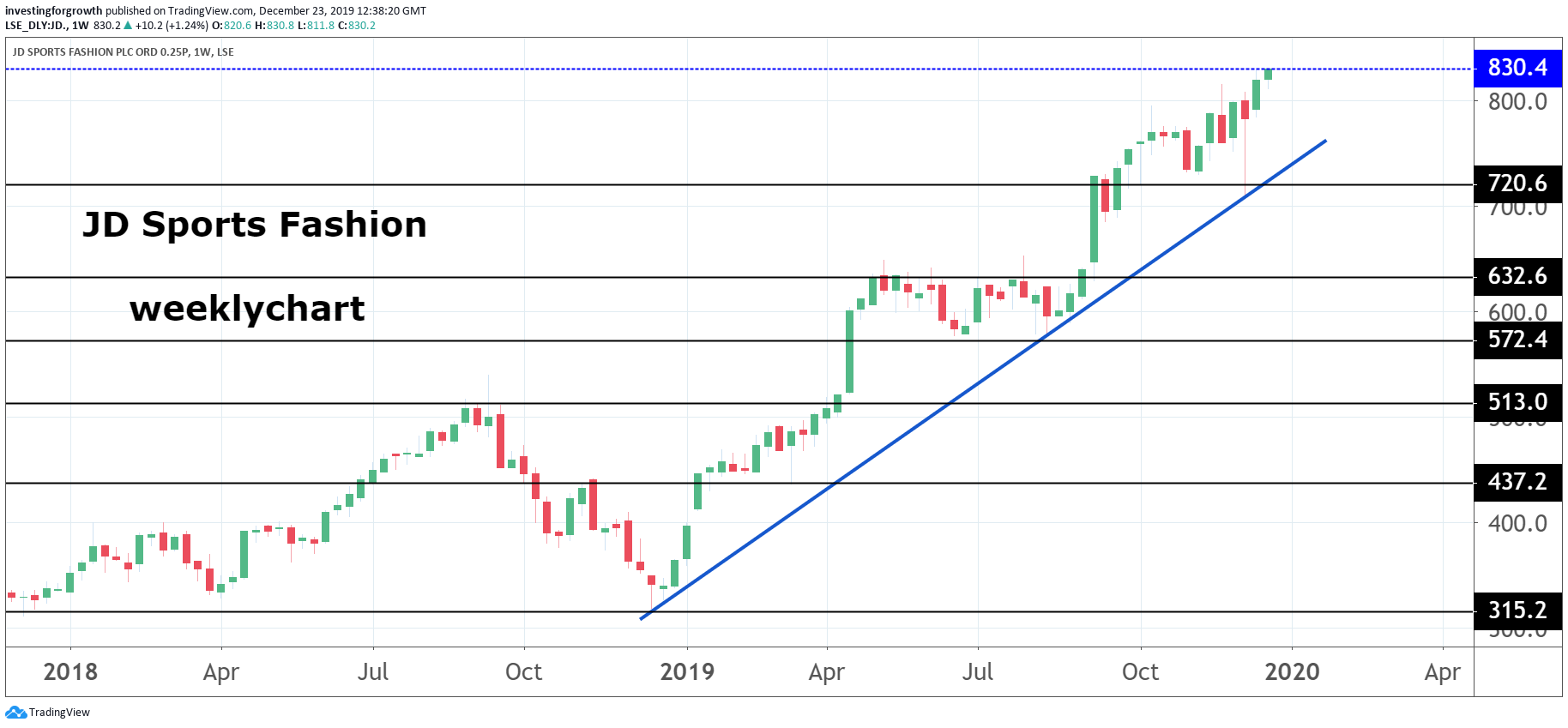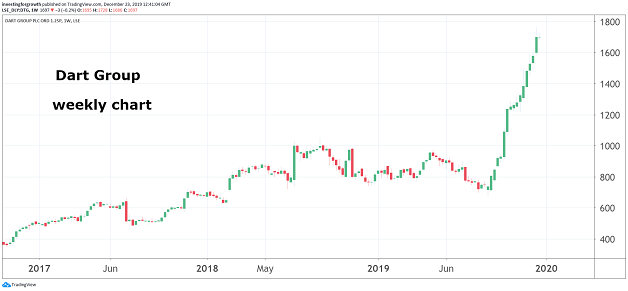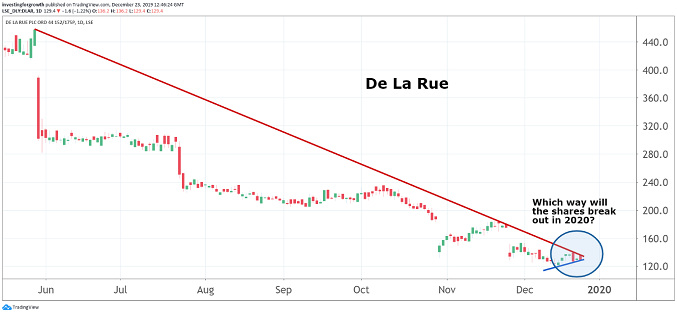Stockwatch annual tips review: The best and worst of 2019
As UK stocks end the year on a high, our companies analyst runs through his tips and offers a new one.
24th December 2019 10:14
by Edmond Jackson from interactive investor
As UK stocks end the year on a high, our companies analyst runs through his tips and offers a new one.

Reviewing 2019, it is apparent how winning stocks involved strong underlying businesses, even if the market periodically got its knickers in a twist. Despite discretionary spending being under a cloud, even the much-maligned retail sector has generated winners.
Meanwhile, among recovery plays it’s been vital to let any new managers get settled in, allowing any “kitchen sinking” to be declared, rather than be swayed by institutional buying.
Retailers delivering out-performance
JD Sports Fashion (LSE:JD.) and Pets at Home (LSE:PETS) are prime examples. JD used to be a small cap stock and “also-ran” relative to Sports Direct (LSE:FRAS), but has powered ahead with one of the most consistently strong charts on the London market.
I drew attention numerous times from August 2010 at a pre-stock split equivalent of 36.2p, when JD’s earnings growth rate was woefully undervalued by its price/earnings (PE) ratio.
Ironically, nowadays, and with the share price at around 810p, it’s the inverse of a decade ago: the stock’s PE multiple buoyed into the mid-twenties versus an historic earnings growth rate in low teens’ percentages. Consensus anticipates around 9% earnings growth for the current financial year to 2 February, then 12% to 2021.

Source: TradingView Past performance is not a guide to future performance
The bull case is that JD has potential to further globalise its brand, although in corporate development terms it’s started to attempt riskier acquisitions – e.g. the troubled Footasylum (LSE:FOOT) last April, which has run into Competition & Markets Authority issues.
Progress has still impressed investors enough for market price to soar 130% this year and, along the way, its executive chairman added 15,000 shares at 613p last July, to own nearly 8.5 million.
On 21x times consensus forward earnings it is not over-priced relative to the sense of a growth stock with a global brand; in the US such a stock might be rated around 30x even higher.
Yet Pentland Group has just recently reduced its majority shareholding from 57.5% to 51%, hinting at a case to lock in at least some gains after such a good run.
- Are JD Sports shares on track to race above 900p?
- Is insider trading a green light to buy this winter winner?
- You can also invest in UK equities via ii’s Super 60 recommended funds. Click here to find out more
Pets at Home (LSE:PETS) exemplifies what the late Jim Slater used to call a “status change” stock – in this case, recovery to growth.
When I drew attention originally at 125p in August 2018 it was London’s third most-shorted stock – allegedly because selling pet products via bricks-and-mortar could not compete with Amazon, and trying to combine veterinary services wouldn’t work.
It was also claimed that younger vets rising in the ranks wouldn’t like a Plc profits culture, and Brexit meant EU vets (meeting a shortage here) were headed home.
Yet a relatively new CEO is defining pet retail/vet care as an integration success story. Investment in lower retail prices and enhanced web offers are winning through, capitalising on a nation of animal lovers willing to spend whatever the economic climate.
So, at 155p last March, I also suggested Pets’ as a key ISA/SIPP tuck-away, given a favourable risk/reward profile to harness the wrappers’ tax advantages than end up a loss you can’t offset.
The stock has enjoyed a bumper 2019 rising over 280p where the PE multiple starts to look rich versus earnings growth however free cash flow is ramping up fast, at around twice earnings. Having tagged the stock a “buy” once again at 208p only last November, I temper my stance to “hold”.
It’s possible this latest squeeze up is caused by hedge funds still short of the stock, buying back, aware of a mistake. I couldn’t see how the business was flawed 16 months ago and it certainly isn’t now; the valuation does look controversial however, according to an earnings or cash flow view, so I wouldn’t dispute anyone preserving gains.
There’s always a special situation somewhere
Mid cap Dart Group (LSE:DTG) in leisure travel and logistics, I rated “buy” last September at 883p after an AGM statement cited strengthening demand for flights and holidays under the Jet2 brand. Then came the Thomas Cook (LSE:TCG) debacle.
Presently, the share price is around 1,710p, the forward PE having risen from about 10.5x to 16x, helped by some earnings upgrading – at least with regard to the current year to March 2020, where a 15% fall has become a 20% rise now anticipate, albeit then a 6.5% slip in 2020/21.

Source: TradingView Past performance is not a guide to future performance
Obviously, this is just a snapshot versus the opportunity in years ahead to gain market share, although plenty still depends on the UK securing a decent Brexit agreement for trade.
With commentators scrambling to share in Boris Johnson’s election success, describing him as “a man who gets things done”, sentiment towards the likes of DTG seems likely to remain positive. According to risk appetite I see it prudent to lock in some gains while maintaining a long-term position.
Fund managers set to continue benefiting
A key reason I like well-run fund management businesses is their operational gearing once fixed costs are covered – profits able to grow faster than revenues – then decent performance from the funds aids asset-gathering, further aiding an upwards spiral.
After the QE stimulus years helped boost asset values and the business cycle, fund managers may continue benefiting in 2020 onwards from the US and China seeing sense to compromise on trade, potentially Brexit uncertainties ebbing too, such that cash flows into stocks again.
Just recently, a wave of capital hit London equities after the general election quelled fears of a hung parliament or Corbyn government. So, unless the proverbial black swan appears, it is hard to envisage the investing context being trashed.
I’ve been keen on mid cap Liontrust Asset Management (LSE:LIO) from 110p in October 2012, and the Conservative landslide has taken its price up to 1,070p, where the forward PE is in the mid-teens, yet earnings growth continues at very substantial rates.
Consensus looks for 68% growth in the current year to March 2020 and 20% in 2020/21; moreover, there’s a material 3.7% yield given Liontrust’s record of very strong free cashflow. A bear market is always going to clobber this kind of stock but, as things stand, “buy the dips” continues to apply.
AIM-listed Miton (LSE:MGR) has unsurprisingly had a bumpier ride as a small cap specialist, then threw in the towel as an independent last September in favour of a £280 million all-share merger with Premier Asset Management to form Premier Miton Group (LSE:PMI).
I’ve been keen on Miton at various times, albeit as a trading situation between “buy” at 25p in January 2015 and “take profits” at 76p in October 2018.
Despite the merger’s prospectus to gain operational synergies, the stock has continued to drift amid political uncertainties hitting small caps. However, following the election it has bounced over 20% to 184p.
I tend to think the likes of Liontrust is the better hold, although yielding 6% and with forecast earnings growth higher than its 13x PE, Premier Miton is one to watch.
Moral: To take greater care in recovery plays
While I always make plain if a “buy” is speculative and not investment grade, where you are weighing odds of different scenarios, I slipped up in the short run regarding banknote printer and security specialist De La Rue (LSE:DLAR). The lesson has wider relevance.
Noting last October at 200p, the stock was broadly an “Avoid” in chart terms, I was intrigued how a re-organisation had been underway for some time, and how the business had a history of good cash generation and a new chairman and CEO.
Schroders’ appearing with a 5.8% stake swayed me to a “buy” rating, while I emphasised the risks and speculation involved, also “the chief hurdle I envisage is weak interims in a month’s time... a fresh root-and-branch review...when the new CEO might also opt to flag any extra house-keeping costs.”

Source: TradingView Past performance is not a guide to future performance
He did exactly that in late November, declaring a new re-organisation and suspending dividends to manage higher debt arising from adverse working capital moves.
I should have sat further back from a business with a troubled past, however good its market position, until bosses have declared “kitchen sinking” and bought equity.
So, De La Rue is evolving to this proper rule, in the sense the CEO bought into the share price fall, pumping in £51,589 at around 138p, with the company secretary also taking £61,327 worth at 139p and another insider £14,546 worth at 145p.
The stock drifted to 125p, which attracted support back up to 135p, and I suspect it is now the recovery “buy” I anticipated.
Edmond Jackson is a freelance contributor and not a direct employee of interactive investor.
These articles are provided for information purposes only. Occasionally, an opinion about whether to buy or sell a specific investment may be provided by third parties. The content is not intended to be a personal recommendation to buy or sell any financial instrument or product, or to adopt any investment strategy as it is not provided based on an assessment of your investing knowledge and experience, your financial situation or your investment objectives. The value of your investments, and the income derived from them, may go down as well as up. You may not get back all the money that you invest. The investments referred to in this article may not be suitable for all investors, and if in doubt, an investor should seek advice from a qualified investment adviser.
Full performance can be found on the company or index summary page on the interactive investor website. Simply click on the company's or index name highlighted in the article.
Disclosure
We use a combination of fundamental and technical analysis in forming our view as to the valuation and prospects of an investment. Where relevant we have set out those particular matters we think are important in the above article, but further detail can be found here.
Please note that our article on this investment should not be considered to be a regular publication.
Details of all recommendations issued by ii during the previous 12-month period can be found here.
ii adheres to a strict code of conduct. Contributors may hold shares or have other interests in companies included in these portfolios, which could create a conflict of interests. Contributors intending to write about any financial instruments in which they have an interest are required to disclose such interest to ii and in the article itself. ii will at all times consider whether such interest impairs the objectivity of the recommendation.
In addition, individuals involved in the production of investment articles are subject to a personal account dealing restriction, which prevents them from placing a transaction in the specified instrument(s) for a period before and for five working days after such publication. This is to avoid personal interests conflicting with the interests of the recipients of those investment articles.